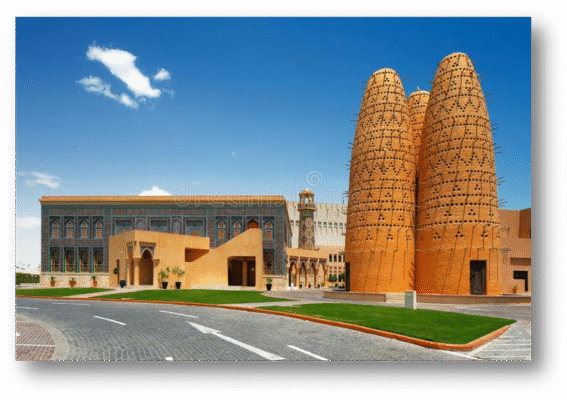Discovering Qatar Through Cultural Heritage Tours
When travelers think of Qatar, futuristic skylines and modern luxury often come to mind. But behind the glittering towers of Doha lies a story deeply rooted in tradition, history, and culture. A Qatar cultural heritage tour offers more than sightseeing—it’s a journey into the heart of a nation that has preserved its past while embracing the future. From bustling souks and historic forts to pearl diving legacies and UNESCO-recognized treasures, these tours reveal the authentic soul of Qatar.
Why Choose Cultural Heritage Tours in Qatar?
Qatar is a crossroads of civilizations, where Bedouin traditions, maritime history, and Islamic culture have shaped a unique national identity. Cultural heritage tours allow visitors to:
- Experience authenticity: Explore traditional souks, forts, and restored villages.
- Understand history: Learn about Qatar’s transformation from pearl trading to modern prosperity.
- Engage with locals: Share traditional meals, stories, and customs passed down for generations.
- Balance modern and historic: Discover how Qatar harmonizes tradition with rapid development.
For travelers who want more than luxury shopping and modern architecture, heritage tours unlock a world of stories and timeless traditions.
Must-Visit Stops on a Cultural Heritage Tour
- Souq Waqif – The Beating Heart of Doha
No cultural tour of Qatar is complete without a visit to Souq Waqif, Doha’s vibrant marketplace. Built on a centuries-old trading site, the Souq is alive with merchants selling spices, textiles, perfumes, and handicrafts.
- Experience: Wander its maze-like alleys, enjoy traditional Qatari dishes, and watch cultural performances during festivals.
- Tip: Visit in the evening when the Souq comes alive with lights, music, and bustling crowds.
- Katara Cultural Village – A Hub of Art and Heritage
The Katara Cultural Village is Qatar’s flagship cultural landmark, designed to preserve traditions while promoting global art and creativity.
- Highlights: Amphitheaters, art galleries, mosques, and performance spaces.
- Experience: Attend film screenings, concerts, and exhibitions showcasing Qatari and international culture.
- Don’t miss: The Katara Amphitheatre, an architectural wonder blending classical Greek design with Islamic features.

-
The Museum of Islamic Art (MIA)
Set on Doha’s Corniche, the Museum of Islamic Art is a stunning architectural masterpiece designed by I.M. Pei. It houses one of the world’s most comprehensive collections of Islamic artifacts.
- Highlights: Manuscripts, ceramics, jewelry, and textiles spanning 1,400 years.
- Experience: Explore the permanent collection, then relax in MIA Park with panoramic city views.
- Tip: Join guided tours for a deeper understanding of the artifacts’ history and significance.
-
Al Zubarah Fort – A UNESCO World Heritage Site
Located on Qatar’s northwest coast, Al Zubarah Fort is a beautifully preserved fort that once protected a thriving pearl trading town. Today, it stands as a UNESCO World Heritage Site and a window into Qatar’s maritime and trading history.
- Experience: Explore archaeological remains, exhibits on pearl diving, and the story of Qatar’s early settlements.
- Why visit: It’s one of the best places to connect with Qatar’s pre-oil heritage and coastal traditions.
-
Msheireb Museums – Stories of Transformation
Situated in the heart of Doha, the Msheireb Museums consist of four heritage houses, each telling a unique chapter of Qatar’s journey.
- Highlights: Exhibits on slavery, family life, oil discovery, and urban transformation.
- Experience: A thought-provoking stop that blends personal stories with national heritage.
- Insight: These museums highlight how Qatar balanced rapid modernization while honoring its roots.
-
Desert and Bedouin Heritage
Beyond the city, the desert holds cultural treasures of its own. Bedouin traditions of hospitality, camel herding, and falconry remain alive today. Many cultural tours include desert excursions where visitors can experience these timeless customs.
- Experience: Stay in Bedouin-style camps, learn about falcon training, and enjoy traditional music around the campfire.
- Unique highlight: Witness a falconry demonstration, a practice considered the pride of Qatari heritage.
Unique Experiences to Include in Your Tour
- Pearl Diving Demonstrations: Learn about the industry that once defined Qatar’s economy.
- Traditional Dhow Cruises: Sail on wooden boats once used for fishing and pearl diving.
- Culinary Tours: Taste authentic Qatari cuisine—machboos, harees, and sweet luqaimat.
- Handicraft Workshops: Try your hand at pottery, weaving, or calligraphy guided by local artisans.
- Festivals and Celebrations: Plan your visit around National Day (December 18) or Eid celebrations for a deeper cultural experience.
Best Time for Cultural Heritage Tours in Qatar
The ideal time to explore Qatar’s cultural sites is between November and April, when the weather is cooler and outdoor exploration is comfortable. Many festivals, including Qatar National Day, add more cultural vibrancy during this period.
While summer months bring extreme heat, making outdoor sites less enjoyable, many indoor museums and cultural centers remain open and air-conditioned, allowing you to continue your heritage journey.
Practical Advice for Exploring Qatar’s Heritage
- Dress modestly: Qatar is conservative; light, respectful clothing is recommended.
- Hire local guides: They offer deeper insights into traditions and hidden stories.
- Stay curious: Engage with locals—many are eager to share personal experiences of Qatari heritage.
- Plan ahead: Some museums and cultural sites have specific opening times or require reservations.
- Combine city and desert: Balance your tour between Doha’s museums and the desert’s Bedouin experiences.
Why Qatar’s Cultural Tours Are Unforgettable
A cultural heritage tour in Qatar is not just sightseeing—it’s a chance to step into the living history of a nation where tradition thrives alongside modernity. From ancient forts and pearl diving legacies to vibrant souks and cultural villages, every stop tells a story.
For travelers seeking authentic connections, these tours deliver more than memories—they offer perspective, understanding, and appreciation of Qatar’s journey from a humble trading hub to a global cultural destination.
FAQs
Q1: How long do cultural heritage tours in Qatar usually last?
Half-day tours typically cover highlights like Souq Waqif and MIA, while full-day tours include Al Zubarah and Katara.
Q2: Are these tours suitable for families?\
Yes. Many sites have family-friendly exhibits, interactive workshops, and open spaces for kids to enjoy.
Q3: Do tours include traditional meals?
Many operators offer dining experiences in heritage restaurants or Bedouin-style camps.
Q4: Is transportation provided?
Most tour packages include hotel pick-up and drop-off with comfortable air-conditioned vehicles.

